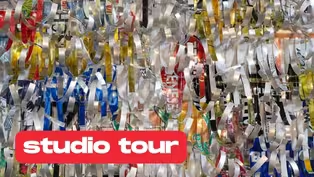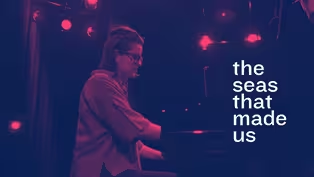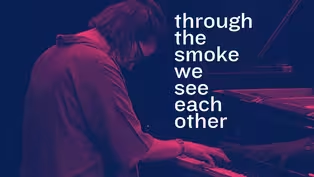
Sohpia Subbayya Vastek Composes the Neoclassical
Clip: Season 9 Episode 2 | 8m 3sVideo has Closed Captions
Sohpia Subbayya Vastek is a pianist and composer based in Troy, NY.
Sohpia Subbayya Vastek is a pianist and composer based in Troy. Her compositions are rooted in classical technique yet explore neoclassical and ambient-inspired sounds. She is also the co-founder of the nonprofit, Organ Colossal. What inspired Sophia to devote her life to music? Find out on AHA! A House for Arts.
Problems playing video? | Closed Captioning Feedback
Problems playing video? | Closed Captioning Feedback
AHA! A House for Arts is a local public television program presented by WMHT
Support provided by M&T Bank, the Leo Cox Beach Philanthropic Foundation, and is also provided by contributors to the WMHT Venture Fund including Chet and Karen Opalka, Robert & Doris...

Sohpia Subbayya Vastek Composes the Neoclassical
Clip: Season 9 Episode 2 | 8m 3sVideo has Closed Captions
Sohpia Subbayya Vastek is a pianist and composer based in Troy. Her compositions are rooted in classical technique yet explore neoclassical and ambient-inspired sounds. She is also the co-founder of the nonprofit, Organ Colossal. What inspired Sophia to devote her life to music? Find out on AHA! A House for Arts.
Problems playing video? | Closed Captioning Feedback
How to Watch AHA! A House for Arts
AHA! A House for Arts is available to stream on pbs.org and the free PBS App, available on iPhone, Apple TV, Android TV, Android smartphones, Amazon Fire TV, Amazon Fire Tablet, Roku, Samsung Smart TV, and Vizio.
Providing Support for PBS.org
Learn Moreabout PBS online sponsorshipSo how did your musical journey begin?
- Well, to take it way back, I was actually born to two professional pianists.
Both of my parents growing up were pianists, which is kind of unusual.
We had two pianos, I guess one for the both of them in the house.
And honestly, my earliest memories are there was a piano.
And I was playing it.
So I think I like to tell people, I've been playing my whole life, and I think that's like genuinely true.
- That sounds amazing.
- Yeah.
- I mean, I can imagine, like, to me that sounds amazing.
I can imagine a lot of people would be like, "Oh my gosh, I need some quiet, peace and quiet."
But I would love that atmosphere.
So you took to it?
- Yeah, I actually, there was a point when my parents realized that I was playing on my own.
I was already reading music.
And I think some combination of them realizing that and me asking for lessons, they were like, "Okay, we should probably give this girl some piano lessons."
But they were very adamant.
They never taught me.
I think that would've been a bad situation.
So we kept it very separate.
I always had other teachers and it just kinda, kept rolling that way.
- And what is it about the piano that attracted you to it?
- That's a great question.
It has such a sense memory for me, just hearing it all the time growing up.
So it's a very, it's a comforting sound for me.
Anytime I'm around it, or I'm hearing it, someone else playing it, I'm just like, "Ugh".
Piano just feels good in my body.
And then also just like the actual instrument itself.
It's like this giant piece of furniture that is just, it has so much power in it.
I love that I can do so much with it.
I can get this huge dynamic range.
I can get so many different kinds of sounds out of it.
It's just, it's a really special, exciting instrument.
And I feel like I'll be exploring it for the rest of my life, you know?
- It's the best instrument.
- It is the best instrument.
- So did you have any favorite composers?
- Growing up?
- Yeah.
- Yeah.
I think I was kind of a strange kid.
But I remember very specifically, I had a teacher in high school who introduced me to Szymanowski, who was this Polish composer, kind of French influences.
Right at the cusp of like, romantic and contemporary music and just really started pushing the language of music.
And I remember playing that composer and just being like, "Wow, there is just this whole other musical world, besides the kind of early classical stuff that I've been playing."
And this is an early compo.
We're talking early 20th century.
Nothing crazy.
But just in my impressionable mind, I was like, "Wow, this is really cool."
And it set me down this path, I think, of contemporary music, and getting more and more present with the music that I was playing.
- So what made you decide to kind of say, "I'm gonna do this as a career?"
- I guess it was really like, when it comes down to it, in high school, when you have to decide what to go to college for.
I was kind of toying around with the idea of doing something else, something either math or engineering based, but really, I don't know, there, at a certain point I was like, "There's no decision here.
Like, I'm a musician.
I wanna audition for music schools."
And it's just kind of, that's been the path.
- And you compose.
So can you describe your music for us a little bit?
- Yeah.
Composing was actually something that came a little bit later.
In classical music, it's kind of this weird dichotomy between people who write music and people who perform music, and that's changing a lot.
But all growing up, all of my studies, it actually was never encouraged for me to even try composing, which I have some anger about, a little bit, you know.
But at a certain point in the last, let's say five years or so, I was like, there's something missing in my craft, in what I'm doing.
And I realized that it was that I needed to write my own music.
And as soon as I started doing that, the floodgates opened.
I would describe my music as, well, I dislike describing it, but I will do it.
- Thank you.
- I would say, like genre-wise, it's kind of neoclassical, post-classical, it's classical adjacent.
But a lot of the kind of formal rules, that sort of thing, I just like don't care about, I don't notate my music.
Like, I don't let other people play my music.
It's just for me to perform.
Not that that won't change maybe someday.
But I'm not a composer in the sense that I'm writing for other ensembles, if that makes sense.
- Okay.
Well, I'm excited to hear you play in a little bit.
But first I understand that you are the co-founder of a nonprofit called Organ Colossal.
Tell us about that.
- Yeah, so my husband and I founded it in 2019.
It's a really small organization.
But we produce and present musical projects, concerts.
We did the Lift Series in collaboration with the Troy Music Hall, which I believe is coming back this coming season.
And we have a really exciting project coming up on October 14th with the music hall, called "KaleidoScape."
I won't say too much about it.
But it's gonna have a lot of musicians from the area involved, which we're very excited about.
- And what kind of music does the Lift Series present?
- Actually, it's a really big range.
I think the, I guess the thread, the thing that we're really interested in, is musicians who are kind of working in between genres.
So yeah, but it's, I think the thing with that series is really the experience of it.
So you're sitting on stage with the musicians.
You're kind of coming through the wings of the music hall.
So it's just, you're just seeing the music hall in a slightly different way, and it just, it feels special, you know?
- That's awesome.
So where do you see yourself in 10 years or so?
What's your kind of artistic goal?
- I love and hate that question.
It's.. (Sophia laughing) So yeah, I have a lot of kind of very specific career goals, like albums that I'm working on and wanna release.
Touring ideas that I wanna pursue.
I think really though, when it kind of boils down to it, the goals are kind of fickle things.
Like, you get there, and then there's the next goal already, and they've overlapped.
And it's really this continuum, right?
And I think for me, especially, I've really needed to figure out how to exist in that continuum so that I'm not constantly let down by reaching that goal, if that makes any sense?
But also kind of holistically, I think I'm chasing this sustainability in my life.
So that means financially, being really smart about that.
But also creatively and emotionally, it's really hard to be a musician professionally.
And so, it just, again, another continuum of constantly tweaking and figuring out the things that I wanna be doing in my life and how to get to those.
And it's just, it's constantly shifting.
- Well, thank you so much for joining me today on AHA!, Sophia, I can't wait to hear you play.
- Thank you.
Thanks for having me.
Artist Christina Hunt Wood Explores Power Structures
Video has Closed Captions
Clip: S9 Ep2 | 7m 9s | Christina Hunt Wood is an African American artist who grew up in rural Upstate New York. (7m 9s)
Sophia Subbayya Vastek Performs THE SEAS THAT MADE US
Video has Closed Captions
Clip: S9 Ep2 | 4m 39s | Pianist Sophia Subbayya Vastek performs her original piece, "The Seas That Made Us," (4m 39s)
Sophia Subbayya Vastek |THROUGH THE SMOKE WE SEE EACH OTHER
Video has Closed Captions
Clip: S9 Ep2 | 4m 39s | Sophia Subbayya Vastek performs THROUGH THE SMOKE WE SEE EACH OTHER. (4m 39s)
Providing Support for PBS.org
Learn Moreabout PBS online sponsorship
- Arts and Music
The Best of the Joy of Painting with Bob Ross
A pop icon, Bob Ross offers soothing words of wisdom as he paints captivating landscapes.













Support for PBS provided by:
AHA! A House for Arts is a local public television program presented by WMHT
Support provided by M&T Bank, the Leo Cox Beach Philanthropic Foundation, and is also provided by contributors to the WMHT Venture Fund including Chet and Karen Opalka, Robert & Doris...



